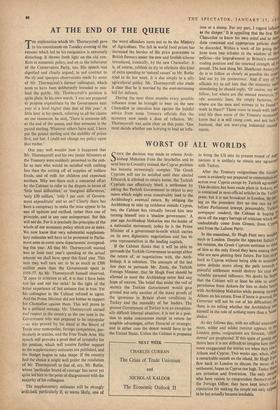AT THE END OF THE QUEUE
IHE explanation which Mr. Thorneycroft gave to his constituents on Tuesday evening of the reasons which led to his resignation is extremely disturbing. It throws fresh light on the old con- flicts in economic policy, and on to the behaviour of the Conservative Party, too. His speech was dignified and closely argued, in sad contrast to the sly and specious observations made by some of Mr. Thorneycroft's former colleagues, which seem to have been deliberately intended to mis- lead the public. Mr. Thorneycroft's position is quite plain. In his own words, 'I was not prepared to propose expenditure by the Government next year at a level higher than that of this year.' A little later in his speech, referring to all the claims on our resources, he said, 'There is someone left at the end of the queue, and that someone is the pound sterling. Whatever others have said, I have put the pound sterling and the stability of prices first, not last. I could not change my policy upon that matter.'
One may well wonder how it happened that Mr. Thorneycroft and his two junior Ministers at the Treasury were suddenly presented to the pub- lic as men who would be satisfied with nothing less than the cutting off of supplies of welfare foods, and of milk for children and expectant mothers. Why was there such a concerted effort by the Cabinet to refer to the dispute in terms of `little local difficulties,' or 'marginal differences,' `only £50 million,' only 1 per cent. of Govern- ment expenditure' and so on? Clearly there has been a conspiracy to make the issue appear to be one of opinion and method, rather than one of principle, and in any case unimportant. But this will not do. For it is precisely the principles of the whole of our economic policy which are at stake. We now know that very substantial supplemen- tary estimates will have to be presented to Parlia- ment soon to cover some departments' overspend- ing this year. All that Mr. Thorneycroft wanted was to limit next year's spending to the actual amount we shall have spent this fiscal year. This sum may well turn out to be as much as £300 million more than the Government spent in 1956-57. As Mr. Thorneycroft himself observed, `If open to criticism at all, it is that I have been too lax and not too strict.' In the light of the bitter experience of last autumn that is true. Yet his colleagues in the Cabinet refused to agree. And the Prime Minister did not bother to support his Chancellor against them. This will prove to be a political mistake. Mr. Thorneycroft earned real respect in the country as the one man in the Government who was prepared to be unpopular —as was proved by his stand at the Board of Trade over monopolies, foreign competition, par- ticularly in textiles, and the Free Trade Area. His speech will provoke a great deal of sympathy for his position, which will receive further support as the supplementary estimates are published, and the Budget begins to take shape. If the country had the choice it might well prefer the resolution of Mr. Thorneycroft to that of, say, Mr. Butler, whose 'particular brand of courage has never yet quite led him to the point of disagreement with the majority of his colleagues.
The supplementary estimates will be strongly criticised, particularly if, as seems likely, one of the worst offenders turns out to be the Ministry of Agriculture. The fall in world food prices has increased the burden of the price guarantees to British farmers under the new and foolish scheme introduced, ironically, by the new Chancellor. It is, of course, rubbish to try to attribute this kind of extra spending to 'natural causes' as Mr. Butler tried to do last week. It is due simply to a silly agricultural policy. Mr. Thorneycroft also made it clear that he is worried by the ever-increasing bill for defence.
During the next three months every possible influence must be brought to bear on the new Chancellor to inoculate him against the baleful advice from some Treasury officials that the economy now needs a dose of reflation. Mr. Thorneycroft was quite clear on this point. 'One must decide whether one is trying to beat an infla- tion or a slump. For my part, I regard inflan as the danger.' It is appalling that the first To Chancellor to know his own mind and to WIa duce consistent and appropriate policies shoal° be discarded. Within a week of his going thee have been two tributes to the wisdom of thel policies—the improvement in Britain's °versa' trading position and the renewed strength of the pound. The best thing Mr. Heathcoat Amory do is to follow as closely as possible the car, laid out by his predecessor. And if any of his officials try to tell him that the economy need` stimulating he should reply, 'Of course, my de° fellow, but where are the unused resources, ibee idle assembly lines, the empty factories, where are the men and women to be found le work in them?' Those more in touch with indlil trial life than some of the Treasury economist' know that it is still rising costs, and not lack c business, that are worrying industrial manage ments.






























 Previous page
Previous page